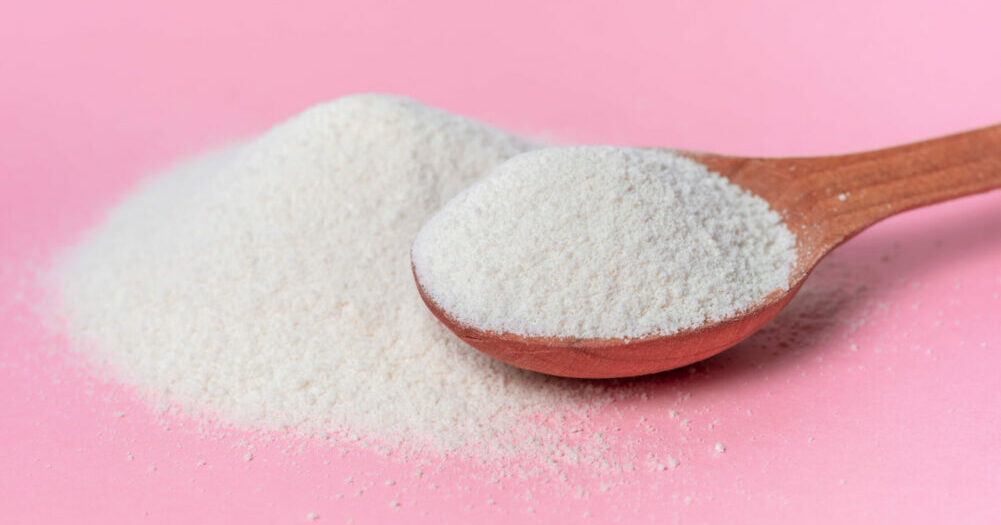Collagen Peptides or Hydrolyzed collagen? In this article we clarify the two names and get to the root of where they come from and what they mean.
There is no difference. The terms collagen peptides and hydrolyzed collagen are synonymous and used interchangeably for the same product. It’s just a matter of semantics. The phrase ‘collagen peptides’ is based on the end product, which are peptides derived from collagen; whereas ‘hydrolyzed collagen’ comes from the hydrolyzation process, the method by which collagen peptides are made.
For a simple illustration, consider the ingredient ‘wheat flour’. You can call it ‘ground wheat’, after the grinding process. Or ‘wheat flour’ after the end product i.e. flour.
So hydrolyzed collagen is just another way of saying collagen peptides.
Hydrolyzed Collagen vs Collagen Peptides: Which phrase to use?
Either one. They’re both legitimate. Though in recent years there has been a trend towards using the name ‘collagen peptides’. This is because the peptides derived from collagen are the key bioactive component; in other words, it’s the bioactive peptides that add value to a wide range of nutritional and nutraceutical products, so it makes sense to use ‘collagen peptides’.
What is collagen?
Collagen is an important structural protein found in animals. Essentially it holds the body together, giving strength, structure, elasticity and cohesion to bones, skin, muscles, tendons, ligaments and cartilage.
There are different types of collagen in the body. Collagen Type I, for example, is made up of very long, tightly packed fibers that give tensile strength to ligaments, tendons and skin. The fibers in Collagen Type II, on the other hand, are shorter thereby allowing cartilage to absorb shock between bones and to cushion joints. So it’s an essential substance for maintaining good physical health.
As we grow older the body produces less collagen, which results in visible signs of aging such as lines and wrinkles. This is because there is less collagen providing elasticity and structural support to the skin.
Collagen (typically skin and bone from fish, porcine and bovine) is the raw material from which products such as gelatin and collagen peptides are made.
What are collagen peptides and what is the collagen hydrolyzation process?

Collagen peptides are short chains of amino acids extracted from native (full-length) collagen via a process called enzymatic hydrolysis (also enzymatic hydrolyzation).
So the native collagen (e.g. bovine hide) has to go through a softening process that allows the collagen peptides to be released from their bonds and safely extracted. At a molecular level collagen is made up of three long amino acid chains that form a triple helix with a high molecular weight. As a result, collagen peptides are part of a tough and insoluble matrix of collagen fibers.
The collagen then goes through a process called enzymatic hydrolysis. This is where a specific enzyme is used to break down the peptide bonds so the collagen peptides can be extracted. The degree of hydrolysis has an impact on the average molecular weight of the final product.
The process of enzymatic hydrolysis is strictly controlled to ensure reproducibility.
Why are collagen peptides (hydrolyzed collagen) beneficial?
Collagen peptides are bioactive. That means, once absorbed into the bloodstream, they can influence the activity of cells in the body in multiple ways. For example, collagen peptides can stimulate fibroblasts in the skin to make more hyaluronic acid, which is essential for skin hydration.
Bioactive collagen peptides can help the body repair damaged tissue. It can provide structural support for skin, contribute to healthy hair, and help maintain bone density. This is why collagen peptides are used for a range of health, beauty and fitness needs.
For example, various scientific studies have shown that collagen peptides can help improve joint health1,2 by protecting cartilage from degradation and helping to reduce inflammation around the joint. This has beneficial effects for people with joint conditions as it can help improve mobility and reduce pain.
Other uses for collagen peptides:
Sports Recovery
Collagen peptides are used by athletes, bodybuilders and sports enthusiasts to help reduce their recovery time following intensive training. Strenuous activity puts a strain on muscle fibers and the wrapping sheath of connective tissues, so the body needs time to heal before doing more training.
Collagen peptides can support recovery by reducing the recovery time, meaning sports-people can maximize their training schedule and improve performance.
As well as faster recovery times, taking collagen peptides can also reduce muscle soreness.

Bone Health
Collagen peptides can support bone health. Bones are predominantly composed of collagen and calcium salts. Throughout a person’s life, bones are constantly repairing and regenerating in a process known as bone remodeling.
As a health supplement, collagen peptides can be used to boost the bone remodeling process and help maintain good bone health. In a recent pioneering study4, researchers found that collagen peptide supplementation can influence the metabolism of bone cells at multiple levels promoting the remodeling process and helping the body maintain the strength of its bones.

Belleza de la piel
Los péptidos de colágeno se utilizan para ayudar a mejorar la salud de la piel y ralentizar los signos visibles del envejecimiento, como las arrugas. Se han realizado varios estudios científicos que demuestran la capacidad de los péptidos de colágeno para ayudar a la belleza de la piel. En 2015, los resultados de dos estudios clínicos4 demostraron que la suplementación con colágeno mejoraba el aspecto y la hidratación de la piel de las mujeres caucásicas y japonesas, respectivamente. Otro estudio5 de 2019 confirmó que la suplementación con péptidos de colágeno tiene efectos positivos en la piel de participantes con distintos tipos de piel.

Si desea conocer más a fondo los péptidos de colágeno, consulte estos recursos
Referencias:
[1] Daily oral consumption of hydrolyzed type 1 collagen
[2] Collagen peptides improve knee osteoarthritis in elderly women
[3] The effects of collagen peptides on muscle damage, inflammation and bone turnover following exercise
[4] The effect of oral collagen peptide supplementation on skin moisture and the dermal collagen network
[5] Rousselot unpublished study 2019
Artículos recientes
63 items

19 Jun 2024
EL RETO SURVIVOR 2024
Hace unos meses, decidimos retar a nuestra embajadora Paula Ellis Fit, Psicóloga Clínica y Deportiva, especializada en Nutrición y Rendimiento Deportivo, e influencer a nivel de estilo de vida salu...

13 Mar 2024
CONOCE A PAULA ELLIS: PSICÓLOGA, NUTRICIONISTA, ...
Paula Ellis (@paulaellisfit) es especialista en los pilares fundamentales de un estilo de vida saludable: nutrición, entrenamiento y psicología. También es influenciadora, experta en nutrición y g...

05 Jan 2024
"A LOS 62 AÑOS, ME NIEGO A ...
En la primera parte de nuestra entrevista con el médico, autor y profesor danés Jerk W. Langer, MD (@jerk.w.langer), Jerk nos cuenta cómo se mantiene en forma y saludable, ofrece información s...

05 Jan 2024
#COLLAGENTALK, EP. 9 – GIMNASTA BELGA LUKA VAN DEN ...
En este episodio de #CollagenTalk, nos acompaña el capitán del equipo belga de gimnasia masculina, Luka van den Keybus. Actualmente ocupa el puesto 20 en el mundo, Luka es una de las estrellas de l...

05 Jan 2024
#COLLAGENTALK, EP. 8; EQUIPO DSM-FIRMENICH NUTRICIONISTA JOB VAN ...
En el atletismo de élite, cada detalle cuenta: el más mínimo impulso al rendimiento puede ser la diferencia entre terminar primero o segundo. Un hombre que sabe esto más que la mayoría es Job van...

15 Jun 2023
Publicado estudio Colartix
¿Sabía que un estudio reciente sugirió que Colartix, nuestra matriz natural de péptidos de colágeno hidrolizados, puede reducir las molestias en las articulaciones?*...

